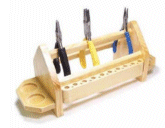|
About Tweezers ~ Alloys and Characteristics
Tweezers
This chart shows typical properties and characteristics of the various materials used for manufacturing tweezers. The points of the harder metals will wear longer and are less subject to bending. The softer metals are less likely to scratch delicate parts and are usually non-magnetic.
Brass Tweezers
Very soft, non-magnetic, often used for handling delicate watch components.
Carbon Steel Tweezers
Made of an extremely hard alloy (> 59 HRC), carbon steel tweezers have very strong tips, but have poor corrosion and acid resistance and easily rusts. Carbon Steel is magnetic and can’t be sterilized.
Carpenter 20 Tweezers
Medium hard, non-magnetic, excellent corrosion and acid resistance.
Ceramic Tweezers
Harder than stainless, anti-magnetic, good resistance to heat and chemicals, and offers good thermal isolation for soldering (solder won’t stick).
Chrome Plated Steel Tweezers
Very hard, magnetic, satisfactory corrosion and acid resistance
German Silver Tweezers
Very soft, non-magnetic, with fair corrosion and acid resistance. German silver (also known as nickel silver, Argentan, new silver, nickel brass, albata, alpacca, or electrum) is a copper alloy with nickel and often zinc. The usual formulation is 60% copper, 20% nickel and 20% zinc. Nickel silver is named for its silvery appearance, but it contains no elemental silver unless plated.
Nickel Plated Steel Tweezers
Very hard, magnetic, satisfactory corrosion and acid resistance
Plastic Tweezers
Soft, non-conductive, never rusts, easy to sterilize, non-magnetic, resists alcohol and solutions containing nitric acid
Stainless Steel Tweezers:
Stainless tweezers are hard, magnetic and have satisfactory resistance to corrosion and acid.
Stainless Tweezers Anti-Acid / Non-Magnetic:
A little softer than regular stainless tweezers, these are non-magnetic with good resistance to corrosion and acids. Suitable for autoclave sterilization.
Titanium Tweezers
Hard, non-magnetic, with excellent resistance to corrosion and acid. Lighter in weight than stainless, flexible, and resistant up to temperatures up to 430°C.
|












